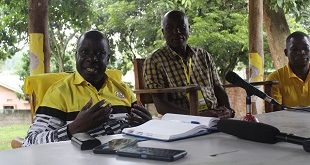
Kampala, Uganda | THE INDEPENDENT | The Uganda Communication Commission (UCC), held the first consultative forum on Artificial Intelligence. The event which kickstarted a national AI strategy, was under the theme “Unlocking the Potential of Artificial Intelligence for Uganda’s Development” marking a pivotal point for Uganda in the 21st century technology landscape.
Nyombi Thembo, the Executive Director of the Uganda Communications Commission (UCC), rallied policymakers to appreciate the advantages that AI comes along with. “AI is not just a means of automation; it is a powerful concept that allows one to rethink lives, work, and challenges,” he said,
He stressed that Uganda has no option but to catch up with other countries of the world in the AI race especially as the technology alters almost all sectors of the economy and societies.
Thembo equated AI to a lever, which is to deliver societal transformation, although AI’s automation aspect is often criticized as a threat to job security, professional ethical disruptions, as well as personal data security concerns, he sought a focus on the opportunities which outweigh the concerns.
Thembo pointed out that AI stands out as a solution to revolutionize the healthcare sector, through enabling early disease detection, using predictive diagnostics. “Telemedicine can bring top-tier medical expertise to remote villages. In agriculture, precision farming powered by AI could optimize crop yields and mitigate the devastating effects of climate change on Uganda’s food security. In education, AI-driven platforms could provide tailored learning experiences, bridging the gap between urban and rural schools, these aren’t futuristic dreams,” Thembo said.
He added that these are actionable possibilities that can be realized with the right investments, partnerships, and commitment.
Michael Niyitegeka, Executive Director of Refractory, emphasized that while Uganda should adopt global AI innovations, its success lies in creating solutions tailored to local realities.
“AI must operate within a context that reflects Uganda’s unique socio-economic fabric,” Niyitegeka stated. He pointed to the Makerere AI Lab as a promising example, where researchers are developing tools like disease surveillance systems for agriculture.
However, Niyitegeka cautioned that scaling such innovations requires a robust pipeline of skilled professionals. “Without a steady supply of trained AI engineers and researchers, even the most promising technologies will falter at the implementation stage.”
The forum emphasized the urgent need to create a fully equipped workforce to help the country leverage AI solutions. Niyitegeka pointed out that Uganda still has a big gap in maintaining its few AI experts because they are always siphoned for better-paying opportunities outside the country which leaves the country with senior AI professionals deficiency. “To bridge this gap, we must invest in building a new generation of AI practitioners, starting with junior engineers who can take on entry-level roles and grow into leadership positions,” he suggested.
He advocated for a multiple-approach solution, integrating AI curricula into universities and technical institutions while offering upskilling programs for professionals in adjacent fields. “We must think beyond borders. The demand for AI talent is global, and Uganda has an opportunity to become a hub for AI expertise in Africa,” he added.
The forum called upon stakeholders to innovate strategies on how to make Uganda a regional leader in AI, by 2030. The meeting also proposed a national AI ecosystem that could integrate solar-powered data centres in rural areas, enabling real-time analytics for farmers. AI-powered drones could deliver medical supplies to remote clinics, while intelligent chatbots could serve as language translators, breaking down communication barriers across the country.
*****
URN
 The Independent Uganda: You get the Truth we Pay the Price
The Independent Uganda: You get the Truth we Pay the Price



